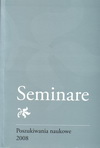
The Way into Belief in the Holy Trinity – the Spiritual Autobiography of Hilary of Poiters
Droga do wiary w Trójcę Świętą. Duchowa autobiografia Hilarego z Poitiers
Hilary in the first book of his work About The Holy Trinity sets his spiritual autobiography which is his way into believing in The Holy Trinity. The bishop from Poitiers starts his search of God from asking questions of the meaning and goal of life. Analyzing different philosophical systems and after words The Holy Bible, he comes to the conclusion that only God is able to feel the tormenting emptiness of the human heart. Hilary’s confession of conversion encourages readers to start together with him the consideration about the Holy Trinity. He stresses that he himself went through everything that was concluded in the work. Hilary’s Spiritual autobiography is also inseparable element of his activities against Arians and shows that only believing into the Holy Trinity a human can reach joy and peace.
More...